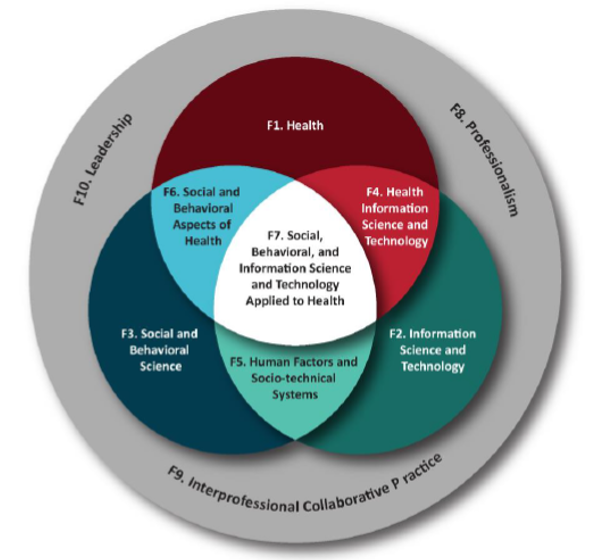Health Informatics or Health Information Management: Which Master of Science Degree is right for me?
INTRO

In the ever-changing healthcare landscape, effective gathering, management, and utilization of data plays a more critical role than ever in improving patient care quality and safety, streamlining operations, and advancing research. The University of Illinois Chicago offers two 100% online asynchronous degrees, a Master of Science in Health Informatics (MSHI) and a Master of Science in Health Information Management (MSHIM). So, which one is the right degree for me?
Overview
While the MSHI and MSHIM degrees share a common goal of leveraging data to enhance healthcare outcomes, they differ in their focus, scope, and methodologies.
The MSHI program concentrates on the use of information science and technology and data analytics to improve healthcare delivery, outcomes, and decision-making. The program will introduce the concepts of digital transformation, data science and artificial intelligence (AI) methods/skills, consumer and mobile health and train leaders to serve as organizational change agents. HI graduates will find jobs with traditional employers such as hospitals, medical groups and clinics, HMOs, health insurance organizations, and life sciences research and public health or government/policy organizations. New and exciting non-traditional employers are also stepping into the healthcare industry and looking for health informatics talent, such as internet and tech companies, hardware and software vendors, health information technology suppliers, and management consulting organizations.
The MSHIM is centered around the strategic management of health information and electronic health records with responsibility for acquiring, analyzing and protecting digital and traditional medical information for revenue cycle/reimbursement, and ensuring ethical, legal and regulatory guidelines within healthcare organizations. HIM graduate demand remains high in traditional healthcare organizations such as hospitals, medical groups and clinics, HMOs, and health insurance organizations. As the demand for healthcare data continues to increase, non-traditional opportunities include health care software companies, consulting, government agencies, pharmaceutical, legal and accounting firms, and academic research. The MSHIM program also makes graduates exam-ready for the Registered Health Information Administrator (RHIA) certification administered by the American Health Information Management Association (AHIMA), which is a requirement for several jobs.
The Curriculum
Between the MSHI and MSHIM programs, the curriculum differs in the competencies taught and areas of focus.
MSHI

The MSHI degree at UIC is a 38-credit hour program that offers concentrations in the areas of . Students develop knowledge and skills in: Data collection, storage, extraction, manipulation, network architecture, data analysis and visualization, predictive analytics, healthcare project management, human factors in computer design, ethics, patient experience and healthcare communications. The core curriculum encompasses various subjects, such as:
- Information Science and Technology: Course topics include network architecture, hardware-software Integration, systems theory, database design, data science and programming.
- Healthcare: Course topics include healthcare information systems, health care data, Health Information Systems Analysis & Design, and medical terminology.
- Social and Behavioral Science: Course topics include social and organizational issues, project management healthcare product management, organizational behavior, communication, ethics, and leadership.
MSHIM

The MSHIM degree at UIC is a 39-credit hour program that meets the requirements of the AHIMA Master’s degree curricular competencies required for the RHIA exam. Students will learn how to manage healthcare data and information resources. The curriculum covers :
- Data Structure, Content, and Information Governance: Course topics include health care delivery systems, health record requirements, classification systems clinical vocabularies and nomenclatures, data design in compliance with governance standards.
- Informatics, Analytics and Data Use: Course topics include analysis and visualization of healthcare data, database management, research, and strategies for exchange of health information.
- Information Protection: Course topics include privacy and security of health information, and compliance considerations.
- Revenue Cycle Management: Course topics include diagnostic and procedural coding, revenue cycle management, and regulatory requirements and methodologies for reimbursement.
MSHI Concentrations
One of the primary reasons a degree program would offer concentrations is to allow students to customize their education according to their specific interests and career aspirations. The MSHI degree offers three concentrations which are:
- Health Data Science: Students will participate in analytic teams, teach data analysis and interpretation, develop skills and practical experience working with healthcare data.
- Consumer and Mobile Health: Students will learn to address digital transformation which includes the consumer and patient perspective, consumer health literacy, and use of mobile and digital technology in healthcare.
- Leadership: Students will get the depth of knowledge needed to address the complexities of healthcare organizational change, use of data to meet strategic objectives and lead a modern and future-focused healthcare system.
CAHIIM-Accredited
Both the online MSHI and MSHIM programs are accredited by the Commission on Accreditation for Health Informatics and Information Management (CAHIIM). This accreditation upholds the quality of education to meet healthcare industry needs and provides students with the required skills and professional attitudes to set them up for employment marketability and continued professional development.
RHIA Credential
HIM professionals who have completed UIC’s CAHIIM-accredited MSHIM degree (or a Bachelor of Science in HIM degree) can earn a Registered Health Information Administrator (RHIA®) certificate. HIM professionals interested in earning the certificate must successfully pass the RHIA exam. Earning a RHIA certificate will set HIM graduates apart from their peers and demonstrate their knowledge of information technology to health care employers.
Career Opportunities*
An MSHI degree opens doors to a wide array of impactful and dynamic career opportunities for students looking to become leaders in digital health and data science. MSHI graduates typically serve in the following roles with a median salary of $80,000:
- Clinical Informatics Analyst: $60,000 and $120,000
- Healthcare Product Manager: $80,000 and $150,000
- Health Informatics Consultant: $90,000 and $150,000
- Health IT Project Manager: $90,000 and $160,000
- Healthcare Data Scientist: $100,000 and $180,000
An MSHIM degree equips individuals with a comprehensive understanding of healthcare data and is the cornerstone for individuals aspiring to excel in the HIM field. MSHIM graduates typically serve in the following roles with a median salary of $70,000:
- Clinical Quality Coordinator: $54,000 and $86,000
- Compliance Officer: $75,000 and $95,000
- Health Information Management Systems Director: $69,000 and $116,000
- Compliance Audit Services Director: $89,000 and $142,000
- Privacy Officer: $105,000 and $172,000
Conclusion
While both the Master of Science in Health Informatics and the Master of Science in Health Information Management programs at the University of Illinois Chicago share a common goal of advancing healthcare through technology and information management, they cater to distinct career paths. Prospective students should consider their professional aspirations and interests when choosing between these two exceptional programs.
*Sources: Glassdoor and ZipRecruiter